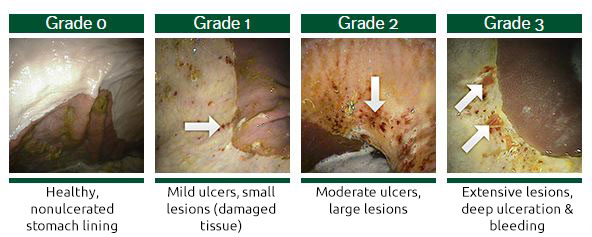
Eroded gastric mucosa (stomach lining) in a horse with EGUS Grade 4 (severe) as seen under a microscope. Photo credit: Abelardo Morales, DVM, MSc, Veterinary Pathologist, Student PhD
“Oxidative stress is evident in horses with EGUS. Consequently, antioxidant therapy may be indicated for supportive treatment protocol of diseased horses.”
Research just published by Turke Shawaf, Wael M. El-Deeb and Magdy Elgioushy in the Journal of Equine Veterinary Science highlights the importance of managing inflammatory hormonal cascades and oxidative stress in horses with gastric ulcers.
Oxidative stress occurs when the body’s levels of damaging ‘free radicals’ or reactive oxygen species (ROS) exceed the supply of antioxidants needed to limit tissue damage.

The team of scientists examined 45 thoroughbred and arabian horses in a bid to identify less invasive methods than gastroscopy for diagnosing equine gastric ulcer syndrome (EGUS). They concluded that blood tests results with elevated levels of some pro-inflammatory cytokines (stress hormones) and oxidative stress biomarkers could be used as preliminary screening to diagnose EGUS.
This information could allow vets and owners to avoid the stress and expense of endoscope examinations in horses less likely to return a positive diagnosis for EGUS.
Read more about this research here.
Top 10 Tips for Reducing Risk of Gastric Ulcers in Horses
-
- Provide access to grass or grass hay (horses need a minimum of 1 to 1.5% of their bodyweight in long stem forage dry matter each day).
- Feed lucerne hay up to 30% of total forage intake.
- Do not leave horses for more than 3 to 4 hours without access to forage.
- Choose low starch (low GI) concentrate feeds such as ‘superfibres’ or legume grains rather than cereal grains or cereal by-products (check the list of ingredients for any pre-mixed or pelleted feeds used). Click here to learn more about feeding horses for weight gain using ulcer-friendly feeds.
- Feed multiple small meals per day rather than one or two large concentrate feeds.
- Give half a biscuit of lucerne hay just prior to working horses or loading onto transport to buffer and form a mat on stomach contents to reduce acid splash.
- Minimise stress – providing some time each day to graze and move freely in contact with other horses reduces chronic stress.
- Add a daily serve of Farmalogic ReLEAF, a drug free option for the gastric comfort of horses. ReLEAF contains pure concentrated aloe vera leaf extract and non-GMO soybean meal fermented by a specific strain of Lactobacillus bacteria shown to assist in reducing the clinical signs of equine gastric ulcers.
- Feed Farmalogic Melox, a scientifically balanced blend of antioxidants to support horses with gastric ulcers undergoing oxidative stress. Antioxidants are most effective at neutralising free radicals when they work together, therefore Melox combines vitamins C and E, organic selenium and a natural source of superoxide dismutase.
- Seek early veterinary intervention and medications if required.




